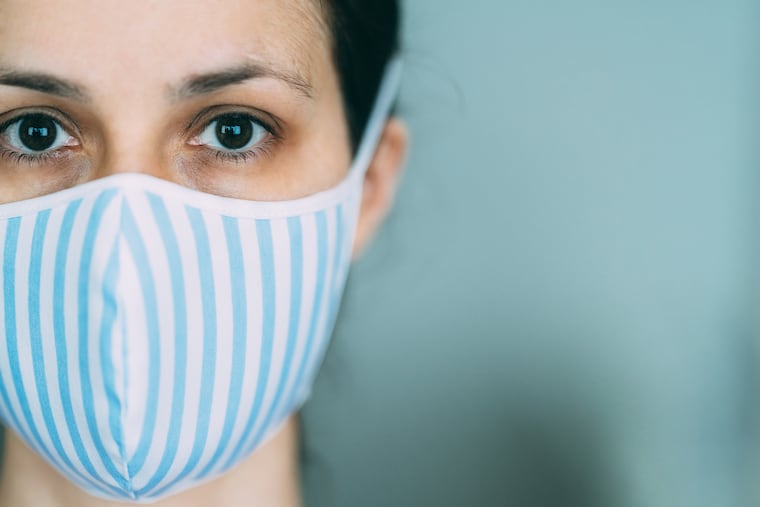How to prevent ‘maskne’ and other face mask skin issues, according to dermatologists
Dermatologists recommend putting the makeup away and using gentle skin products to stop mask-related breakouts.

Wearing masks to reduce the spread of coronavirus is still required in Pennsylvania and New Jersey for shoppers and workers at essential stores, but the practice has led to a new complaint — “maskne,” breakouts caused by wearing a mask for long periods of time.
Part of the reason why people might get maskne is because the skin experiences a lot more friction than normal in the area that’s covered, said Nazanin Saedi, director of Jefferson Laser Surgery and Cosmetic Dermatology Center.
“The real term is acne mechanica,” she said. “You see it where there’s constant rubbing on skin, like athletes who get acne from wearing helmets and pads. Similarly, masks create a moist environment where bacteria can grow. Normally the skin airs out on its own, but everything is building up under the mask.”
» READ MORE: Stop wearing your mask wrong: Common mistakes and how to fix them
Stop wearing makeup
Part of the problem is that the face is not used to having something cover the nose and mouth for long periods of time, said Carrie Kovarik, an associate professor of dermatology at the Hospital of the University of Pennsylvania. It’s impossible to prevent irritants from building up in that area completely, she said, but putting away the concealer and foundation can provide some relief.
“A lot of people are still wearing makeup in that area,” Kovarik said. “Usually makeup and skin oils have the chance to evaporate and slough off, but the mask clogs everything up. It creates a different environment in that area of skin.”
Don’t overcompensate with washing
Even though it may feel counterintuitive, Saedi said that people can actually worsen their breakouts by washing their face more often.
“When you overcompensate, you’re stripping natural oils off your skin and making it more irritated,” she said.
Saedi advised steering clear of harsh scrubs and toners, which do more harm than good, and using something more gentle, like CeraVe Hydrating Face Wash or Neutrogena Ultra Gentle Daily Cleanser. If your skin is acne-prone, she recommended using a cleanser with benzoyl peroxide, an ingredient that kills bacteria under the skin.
Opt for cloth masks
While surgical masks are better at protecting people from the coronavirus, they don’t breathe as much as cloth masks. Kovarik said cloth masks are more beneficial for people dealing with skin issues because they don’t create as humid of an environment.
“Cloth masks breathe a little more,” she said. “Also, they don’t create as much friction as a surgical mask.”
Kovarik said that people with acne, eczema, or itchy skin should select a mask made from a softer fabric, such as cotton, which allows more air circulation than polyester.
“If you’re in a safe environment, you should take a break from the mask," she said. “Let your skin breathe. That really helps prevent irritation.”
Saedi said that it’s important to wash fabric masks every day because face oils, makeup, and dirt can build up on the inside.
“If you’re reusing a medical mask, air it out for as long as possible,” she said.
» READ MORE: How to clean your cloth face mask
Hydrate with moisturizer
After washing your face, put on a hypoallergenic moisturizer to increase the amount of hydration in your skin, Kovarik said. She recommended choosing a product with hyaluronic acid, which is a sugar naturally found in our bodies that helps skin retain moisture.
Using a moisturizer with ceramides, such as CeraVe Daily Moisturizing Lotion, can also help with moisture retention, said Saedi.
“It builds a layer of protection between your skin and the mask,” she said, because ceramides are lipids that form the skin’s barrier.
Kovarik also suggested cutting back on products that contain retinoids or acid, since they can become more potent under the mask, causing irritation.
“Things that might not have irritated your skin or clogged your pores before may start doing that because you have this thing covering your face,” she said. “You want to use really mild cleansers and moisturizers with no fragrances or color.”